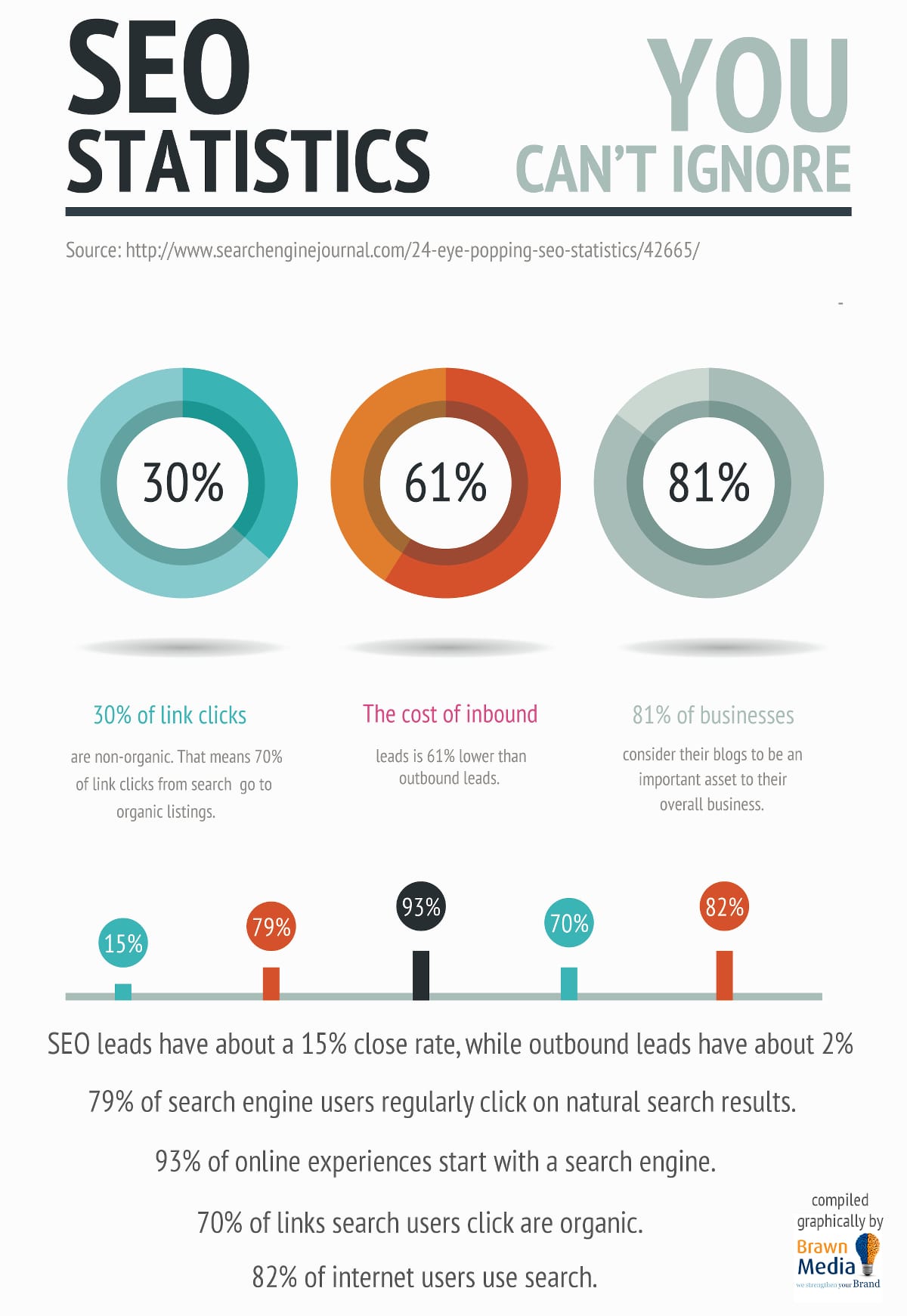If you own a small business, you have inevitably engaged in some do-it-yourself Search Engine Optimization (SEO) or outsourced to an SEO company. But, what form of SEO were you practicing? This article specifically addresses Off Page SEO best practices. Implement all these tactics and be prepared for Search Engines to reward you for your hard work!
It’s 2017 and gone are the days of debating whether or not implementing best practices to have your website show up on the internet is worth the time and expense.
The statistics around SEO are compelling and simply can’t be ignored if you care about the success of your business.

But if you are a small business owner, you probably know some of these stats or, at the bare minimum, understand the value of organic traffic. So, the problem is not whether SEO is valuable—it’s more about how you hire a San Diego based SEO company and what exactly they will do.
You might be receiving ten calls a day from self-proclaimed experts, and everyone is quickly rattling off different types of SEO and nonchalantly dropping in the phrase “backlinks.” These calls probably annoy you and distract you from what was mission critical to the day.
This article is intended to clear the air on Off Page SEO. By the time you are done with this blog post, you will have a clear understanding of Off Page SEO strategies. Use the information to implement the tactics on your own, to arm yourself when interviewing an SEO company, or to have talking points with your current SEO partner.
What Do I mean by Off Page SEO?

The four main types of SEO are Local SEO, On Page SEO, Technical SEO, and Off Page SEO. If you research Off Page SEO, you will find that the internet does not have a uniform definition of the term. In fact, I find many authors miscategorize practices and tactics when talking about SEO.
Off Page SEO refers to factors external to your website—things that you or others are doing on the web but outside of your website. While there are several factors, the primary Off Page SEO discipline is link building.
If you read Upwork, Freelancer, or Guru, you will find site owners posting briefs for SEO and saying they need link building. What these site owners do not understand is that there are many important tasks that need to take place before you can even think of building links. The commitment to producing high quality content on a regular basis is a prerequisite to going after links. Site owners link to great content that enhances their content and consequently enriches the site visitor’s experience.
Good SEO professionals will typically work through Technical SEO and On Page SEO best practices prior to rolling out a content-heavy strategy. It just makes sense to build a good foundation prior to spending time, resources, and money on lengthy blog postings, videos, and infographics. Don’t get me wrong—I am certainly an advocate of Off Page SEO, but I recommend a properly timed approach.
Backlinks Explained
A backlink is a link on someone else’s website that links to your website. For example, if I wanted to share the most comprehensive guide to backlinking on the internet, I would recommend you check out Brian Dean’s Definitive Guide. I just gave Brian Dean a backlink, and he deserves it because he creates incredibly valuable content.
Links are a vital ranking factor. In fact, in March 2016 Google came out and said that, right next to content, links are a top 3 ranking signal.
But, what Google looks for in terms of your site’s links has changed over the years. It’s not as simple as how many backlinks you have. Let’s dive into how you can measure the success of your backlink profile.
Anchor Text
When it comes to link building I often see people use the Anchor Text incorrectly. Anchor Text is the actual text on the page that links to another article. If you scroll up a little bit you can see the last anchor text I used to link out was “top 3 ranking signal.”
In recent years Google changed how they looked at Anchor Text. This change was intended to stop people from abusing the use of exact match keywords in their anchor text to game the algorithm and influence their rankings.
The main point with Anchor Text is to take the time to learn the different types and utilize a strategy with a healthy blend of different types of Anchor Text. This commitment to a versatile Anchor Text strategy shows Search Engines you are writing in a natural tone that is conducive to a good experience for site visitors.
To read up on the different types of Anchor Text and learn more about Anchor Text Best strategies, check out this great guide from OutreachMama.
Authority of Linking Domain
The most important factor is how authoritative the linking domain is. The underlying assumption is that important websites will receive links from other important websites. Let’s say you have a law firm in San Diego and you produce great content on a regular basis. One day, you receive a link from FindLaw, a very prominent publisher in the legal community. This link will show Google that your site is valuable and is being recognized by prominent sites on the web.
You want links from sites with a high PageRank. The links will help your ranking more than links with a low PageRank. Please note, Google does not disclose a site’s PageRank publicly, but it is an important part of their algorithm.
Google may have an internal way to evaluate domain authority, but Moz has also developed a proprietary system for Domain Authority.
Number of Linking Domains
This is an area where we have seen a pretty substantial change. Prior to Google’s Penguin update, the quality of the links were not a factor, so it was all about quantity. Today, number of links is still very important, but the authority and relevancy of those links are also considerations.
Link Relevancy
You want to get links from sites that have content relevant to your site. If you are a real estate agent and you author a home buyer’s guide, you would want to gain a link from an authoritative site about residential real estate. A link from a fitness site will carry little weight.
Nofollow Links Do Not Count
Google announced that nofollow links are not a ranking signal. Keep an eye out for your backlinks with the attribute.
Spam Links
When building your link profile, you will want to build a diverse link profile. Too many links of one type could indicate spam
The Goal of Link Building

Before I jump into link building strategies, I’d like to summarize the goal of link building. There is a lot of conflicting information online, and strategies have changed over the years to keep up with algorithm changes. The basic goal is to build as many high quality links from authoritative and relevant sites in the spirit of increasing your organic rankings.
I should probably address some of the shortcut strategies and services online that sell links. Buying links has always been tempting to site owners, but it is black hat SEO and it’s a big no-no.
There are a number of sites that sell links and services on Fiverr where you can buy links. I advise you to refrain from the temptation and stick to white hat SEO strategies to build out your link profile. Buying links can backfire and result in manual penalties or having your site deindexed by Google. Google uses a number of methods to combat paid links and determine whether a link was purchased or earned naturally. In fact, Google even has a part of Search Console dedicated for users to report paid links.
Link Building Strategies
Produce Great Content and Reach Out
Like I said early on in this article, producing high quality content is the precursor to a backlinking strategy. If you’re serious about SEO, you should be producing high quality content on a regular basis. When I say content, first and foremost I am talking about blog content. In depth blog articles are the easiest place to start. Here are the steps we use at Rocket Pilots to create our blog postings:
- Conduct Keyword Research – For keyword research we use Google Keyword Planner, Google’s Autocomplete, “searches related to” (at the bottom of the SERP), and io.
- Review Keyword Tracking – We also review how we are doing for certain keywords. To determine where we rank for specific keywords, we review Google Analytics, Google Search Console, Bing Webmaster Tools, and my favorite keyword tracking tool, Authority Labs. Look for keywords that are on the rise or keywords that are on the second page. It could be that next great article that bumps you to the first page.
- Decide on a Topic – Once you have identified your focus keyword, come up with an article incorporating the focus keyword that will be engaging to your audience. If you need ideas, review competitor articles or use BuzzSumo to identify popular topics that have been written about your focus keyword.
- Write or Outsource – Write your own article or outsource the work to a freelance writer. If you outsource, choose your partner wisely and be prepared to provide clear direction of what you are looking for.
- Upload – Once your article is complete, upload it to your blog, optimize it for SEO, add multimedia, and share it on your social media.
Now that you have a killer piece of content, you’ll want to identify relevant sites that could benefit from your article. Here is the process for reaching out to site owners and publishers:

- Conduct Research – Nothing fancy here, just sit down, search the web, and aggregate a list of websites that are relevant to your industry. You are looking for sites that are not competitors but produce content that covers your industry, products, and services. This list will be integral to your outreach plan and will be a living and breathing document that you will need to periodically update.
- Find Specific Articles – Subsequent to identifying the site, you will need to scour through their specific articles looking for a linking opportunity. Try to identify not only a relevant article but a specific paragraph in the article where your link would enhance the user experience.
- Build Relationships – This is by far the most important part of the process. If you have a strong relationship with the publisher or site owner, your outreach is likely to be well received. You can start building relationships via Facebook, Twitter, and Instagram. Try leaving positive comments on their Facebook, retweeting their tweets, and sharing their content. You need to get yourself noticed by the brand instead of starting off by asking for something.
- Ask – Now it’s time to reach out to the site owners and simply ask for the backlink. Be sure to make the request easy on the site owner. Include the article you want to link to, the specific spot in the article, your link, and a succinct reason for how the link would enhance the article.
- Repeat this process over and over again, and you will inevitably end up with a growing profile of high quality links.
Broken Link Building
Broken Link Building is the process of identifying broken links and asking the site owner to swap out the dead link with your link. This process has a high success rate because you’re doing the site owner a favor. Nobody wants a dead link on their site. So if your link connects to a great relevant piece of content, there is a good chance they will award you the link.
The first step in the process will be to find broken links. You will want to do this in a structure that facilitates finding an abundance of broken links at one time. This is mainly because you will need to reach out to a large amount of site owners in a methodical way in order to start gaining a sufficient amount of links. I’ll tell you upfront that most people give up on the process way too soon. You will need to be resilient and stick to the process. Over time you will have success and gain more links than your competitors.
You’ll want to add a few tools to your digital marketing toolchest. Check My Links Chrome Extension is a free tool that will crawl a page and identify broken links. Xenu Link Sleuth is a free piece of desktop software that can check hundreds of pages at once for broken links.
Once you’ve identified broken links, you’ll need to get busy emailing site owners and asking them to replace the broken links with your link. Be sure to tightly track the responses. You may need to politely ask more than once.
Quora, Yahoo Answers
Another strategy for building backlinks is using your expertise to help out others online. Quora and Yahoo Answers have a constant stream of people asking questions on a variety of topics.
Take this as an opportunity to provide thoughtful responses and, where appropriate, link back to your website or to an article on your site that specifically addresses the user’s question. The most important point here is to sincerely help other users and not to spam Quora or Yahoo. Answer thoroughly and thoughtfully. Set a goal to be the top rated response to the question on Quora.
Here are two strategies I use on Quora:
- I answer SEO questions that have very recently been asked. I make sure that my response is extremely thorough and clearly solves the user’s problem. Since it’s unlikely someone will try to write a more thorough response, my reply remains at the top.
- With this strategy, I look for an SEO question that has many replies but where the replies are short and not very comprehensive. From there, I write a reply that is longer and more in-depth than every other response. This will typically conclude in my reply getting up-voted to the top.
Guest Posting
Guest posting can help but only in specific scenarios. Only write a guest post if your posting is going to be killer and be placed on a credible website.
The concern with guest posting is that the practice has been abused. Google noticed and put a lot less weight into guest posting as a ranking signal. Here are a few red flags for guest posting:
- Someone was paid to publish the post
- The site was built exclusively for guest posting; every blog article is a guest post
- The links are always exact match anchor text
- The site’s content is not related to the content of your article
If you decide to guest post or guest blog, make sure your strategy is sound and thoughtful. Kissmetrics has put together a great guide on guest blogging.
Citations
I cover citations more thoroughly in my article about Local SEO, but here I’ll cover how they relate to Off Page SEO. Since a citation is your name, address, and phone number listed on a directory, it is effectively a backlink.
A citation on a directory like Yellowpages, Yelp, or Superpages is referred to as a structured citation and will help your local ranking.
All citations are not created equal so there is no need to overlist your site. Stick to the core directories and don’t waste your time with a spammy directory that barely gets any traffic.
Reviews

Online reviews are also a form of Off Page SEO. To the best of your ability, you’ll want to manage your reputation on Yelp, Google My Business, Yahoo Local Listings, Angie’s List, Better Business Bureau, and Facebook. Those are just a handful of well-known review platforms, but there might be review sites that pertain to your specific industry. For example, if you are a San Diego Dentist, you probably want to manage your reviews on Healthgrades. If you are a San Diego Lawyer, you will want to manage your reviews on Avvo. Managing reviews is critically important. According to Moz, 67% of consumers are influenced by online reviews.
You won’t be able to control what people write, but you can still decide to take a proactive approach to reputation management and take the time to understand how each of these platforms operate.
Google will allow you to request reviews; however, asking for reviews would be against Yelp’s policy. It’s important to understand each platforms’ policies. You will also want to keep an eye out for negative reviews and promptly and professionally respond to the criticism. Every story has two sides, and it’s important the community understands your perspective.
Since Google’s goal is to provide users with relevant and useful results, they often include directory sites on the search engine results page or on business listings with review information. If you properly built up your Yelp listing, your Yelp profile could be on the first page of Google for a keyword that your site does not rank for. Or, your site could be listed with your review info and could result in a higher organic click-through-rate. Organic CTR is actually a ranking signal, so having a high CTR could improve your ranking.
Summary
If you have dialed in your Technical and On-Page SEO, it’s time to get moving on your Off Page SEO strategies. Make a concentrated effort to ramp up your content production efforts so you have content that is worth linking to. But, remember not to sit idle and hope for backlinks. Every once in a while you might get lucky and pick up a high quality link without trying. Most of the time you will need to build relationships and consistently reach out to site owners to build out your link profile.
Answering questions on sites like Quora and Yahoo will demonstrate your expertise, help potential clients, enhance your online reputation, and build links back to your site.
Guest posting, if done properly, will showcase your knowledge, improve your online presence, provide new backlinks, and open up a new traffic source.
Managing and building your reviews online are no longer optional. It is absolutely imperative if you care about your company and want to stand out from the competition. Reviews help people conduct due diligence before hiring you or visiting your business, the platforms provide a new traffic source, and they allow you to piggyback on larger brands’ SEO.
Remember that Off Page SEO tactics will require your persistence, consistency, and patience. It may take a while to see the fruits of your labor, but be patient and over time you will see your rankings skyrocket.
Have you implemented any of these tactics? Feel free to share your experience with Off Page SEO.
As always, if you see the value in Off Page SEO, but don’t have the time to implement these tactics, contact us today for a complimentary consultation.
